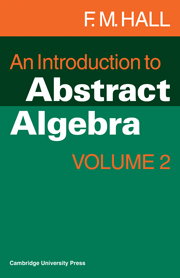Summary
Introduction
The study of vectors, particularly of their algebraic properties, is often best performed by considering the set of all vectors of a given type (for example that of all three-dimensional vectors with real co-ordinates) and the algebraic structure which these comprise. Such a structure is called a vector space and, as we expect, may be defined by taking as axioms a very few fundamental laws which we require it to satisfy. It turns out that, in the ‘finite dimensional’ case (we anticipate a little in the present section the ideas which will be developed formally later in the chapter), our basic axioms characterise completely sets of what we would naturally think of as ‘vectors’: in other words they lead to no structures that are not immediately recognizable as sets of vectors in the elementary sense. (This is quite different from the case in group theory, where there is an extraordinary richness of possible structure, and from fields, where we lay down a large collection of axioms and still obtain a fairly wide diversity of structure.) The advantage of approaching the subject axiomatically is, as always, that we know precisely what we may assume and with what we are dealing: the work follows rigorously from the axioms and we are made aware of the distinction between fundamental properties and derived ones.
We come now to an important point. Any advanced, or even fairly advanced, work on vectors leads inevitably to the study of matrices, and to the whole vast subject of what is known as ‘linear algebra’.
Information
- Type
- Chapter
- Information
- An Introduction to Abstract Algebra , pp. 225 - 272Publisher: Cambridge University PressPrint publication year: 1969
